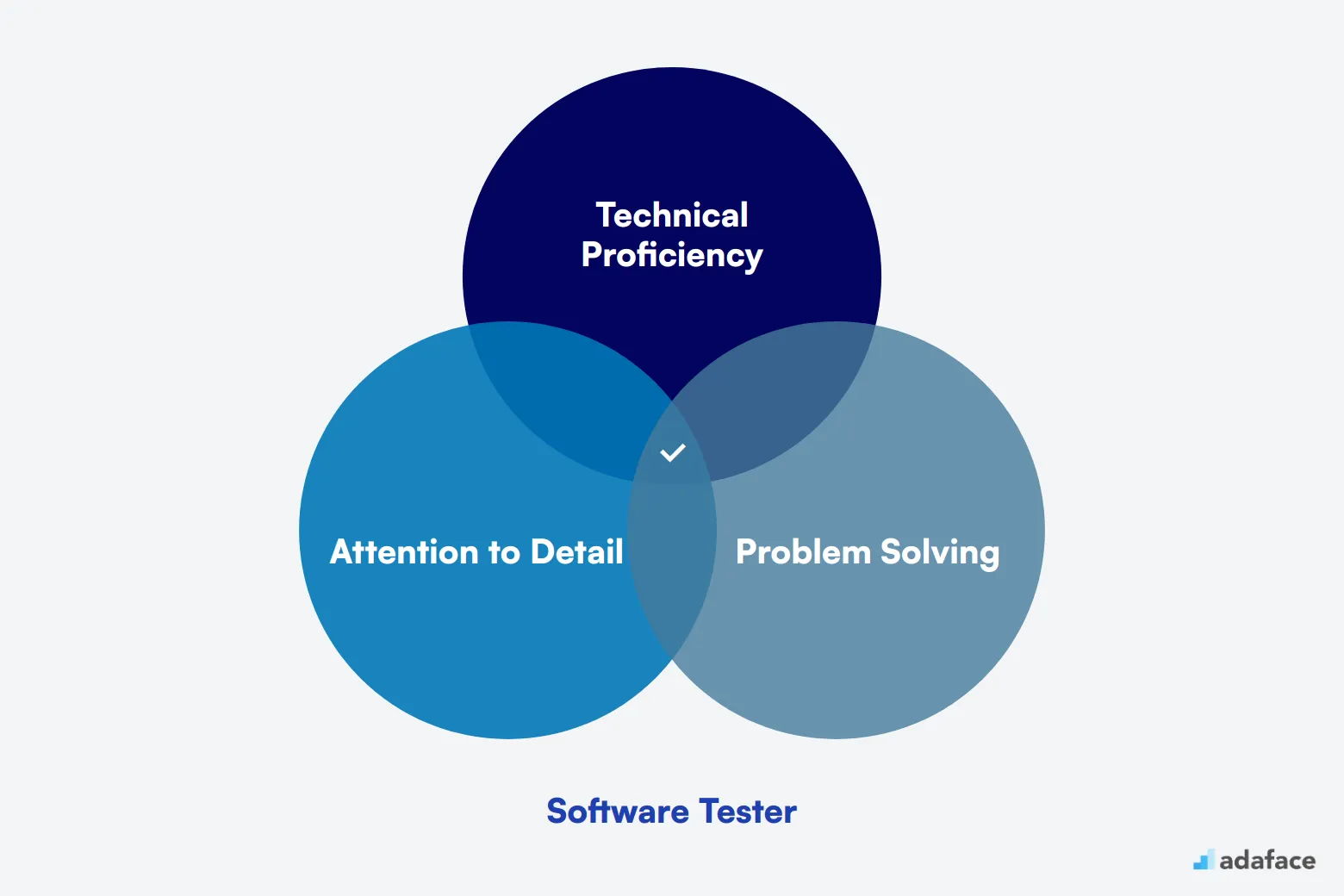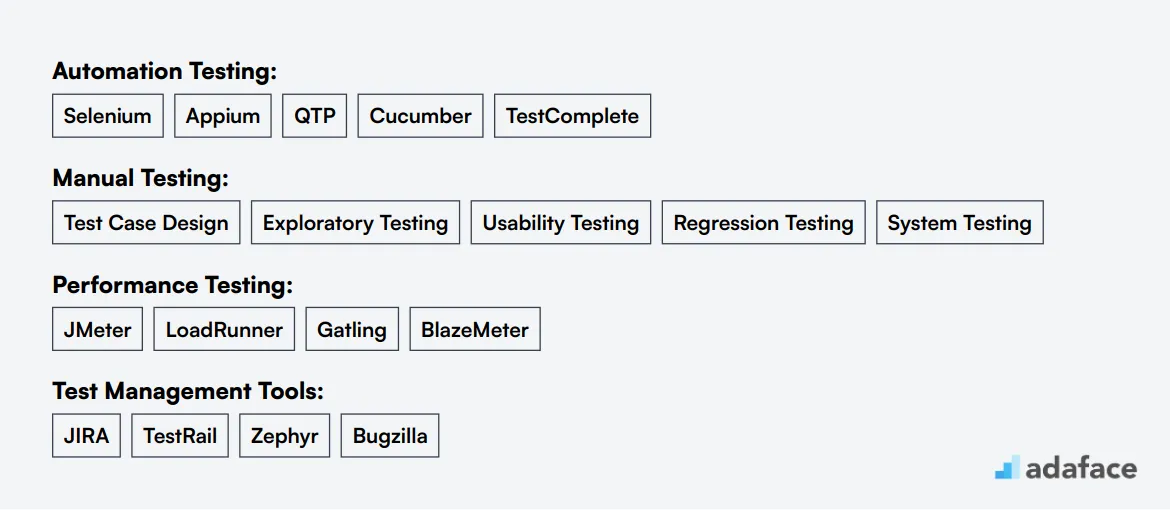In today's fast-paced digital landscape, ensuring software quality is more important than ever, and this is where a skilled software tester can make a difference. Many companies struggle to find the right balance between technical skills and the keen eye for detail required in this role. Often, the challenge lies in understanding the breadth of responsibilities a software tester takes on and the specific skills that are necessary for your unique needs.
This article guides you through the essentials of hiring a software tester, from understanding their role to navigating the hiring process effectively. We'll explore the key qualifications to look for, how to craft an effective job description, and where to find top talent. For more detailed insights, check out our Software Tester Interview Questions guide.
Table of contents
Why hire a Software Tester?
Software testers play a key role in ensuring product quality and user satisfaction. If your company is experiencing issues with software bugs, user complaints, or delayed releases, it might be time to bring a tester on board.
Consider hiring a software tester when:
- Your development team is stretched thin and can't focus on thorough testing
- You're planning to launch a new product or major update
- Your current QA process is manual and time-consuming
Before committing to a full-time hire, you might want to start with a software testing consultant to assess your needs. This can help you determine if a permanent tester is necessary for your team's success.

What Does a Software Tester Do?
A software tester plays a key role in ensuring the quality and reliability of software products. They meticulously examine applications to identify bugs, glitches, and inconsistencies before the product reaches end-users.
The day-to-day responsibilities of a software tester include:
- Designing and executing test cases
- Reporting and documenting bugs
- Collaborating with developers to resolve issues
- Performing various types of testing (e.g., functional, performance, usability)
- Analyzing test results and providing feedback
- Staying updated on testing methodologies and tools
- Participating in product requirement discussions
Software Tester Hiring Process
The process of hiring a software tester typically spans 4-6 weeks. Here's a quick overview of the key steps:
- Create and post a detailed job description
- Review resumes and shortlist candidates (1 week)
- Conduct skill assessments or coding tests (1 week)
- Interview shortlisted candidates (1-2 weeks)
- Make an offer to the best candidate (1 week)
Each step plays a critical role in finding the right software tester for your team. Let's dive deeper into these stages and explore best practices for a successful hiring process.
Key Skills and Qualifications for Hiring a Software Tester
When hiring a Software Tester, creating an accurate candidate profile can be challenging. It's easy to misjudge what's required versus what's preferred, leading to either overspending on qualifications or missing out on suitable candidates. Therefore, understanding the nuances of must-have versus nice-to-have skills is critical.
Below are the key skills and qualifications that should inform your search for the ideal Software Tester. The required skills are essential for immediate competency, while preferred skills can enhance a candidate's potential and adaptability.
| Required skills and qualifications | Preferred skills and qualifications |
|---|---|
| Bachelor's degree in Computer Science, Information Technology, or related field | Certification in software testing (e.g., ISTQB, CSTE) |
| Two or more years of experience in software testing or QA | Experience with performance testing tools like JMeter or LoadRunner |
| Strong understanding of software development life cycle and testing methodologies like Agile and Scrum | Familiarity with programming languages such as Java, Python, or JavaScript |
| Proficiency in test management software like JIRA, TestRail, or Zephyr | Experience in testing mobile applications on iOS and Android platforms |
| Experience with automation testing tools such as Selenium, Appium, or QTP | Ability to work collaboratively in an Agile/Scrum team environment |
How to write a Software Tester job description?
Once you have a candidate profile ready, the next step is to capture that information in the job description to attract the right candidates. A well-crafted job description can make a significant difference in your hiring process.
- Highlight key responsibilities and impact: Clearly outline the core responsibilities of the software tester, such as designing test cases, executing tests, and reporting defects. Making it clear how their role contributes to product quality will draw in candidates who are looking to make a difference.
- Balance technical skills with soft skills: While it’s important to specify technical expertise in testing tools and methodologies, don’t forget to include essential soft skills like attention to detail, analytical thinking, and effective communication. A well-rounded candidate will not only excel in testing but also collaborate seamlessly with the development team.
- Showcase unique selling points: Mention what sets your company apart, whether it's a dynamic work environment, innovative projects, or opportunities for professional growth. This information can attract candidates who resonate with your company culture and values. For example, you can refer to our detailed Software Tester job description for more insights.
Top Platforms to Hire Software Testers
Now that you have your job description ready, it's time to list your openings on job listing sites to attract potential candidates. Leveraging popular hiring platforms will help you reach a diverse pool of software testers to find the right fit for your team.
Ideal for finding full-time software testers due to its vast professional network and detailed job listing features.

Indeed
Suitable for bulk job postings for full-time positions; extensive reach and diverse applicant pool.

FlexJobs
Best for remote job listings, attracting candidates who are experienced in remote testing environments.

Some of the top platforms available include LinkedIn, which is ideal for full-time roles due to its extensive professional network, and Indeed, known for its broad reach and bulk job posting capabilities. For those seeking remote testers, platforms like FlexJobs and We Work Remotely specialize in providing access to candidates experienced in remote testing environments.
Keywords to Look for in Software Tester Resumes
Resume screening helps you quickly identify promising candidates from a large applicant pool. It's a time-saving first step in finding the right software tester for your team.

When manually screening resumes, focus on key technical skills and qualifications. Look for terms like 'software testing methodologies', 'test management tools', and specific automation testing tools like Selenium or Appium.
AI-powered resume screening can streamline this process further. You can use tools like ChatGPT or Claude to analyze resumes based on predefined criteria, saving time and reducing bias in initial screenings.
Here's a sample prompt for AI-assisted resume screening:
TASK: Screen resumes for software tester role
INPUT: Resumes
OUTPUT: For each resume, provide:
- Email id
- Name
- Matching keywords
- Score (out of 10)
- Recommendation
- Shortlist (Yes, No, Maybe)
KEYWORDS:
- Testing methodologies (Agile, Scrum)
- Test management tools (JIRA, TestRail)
- Automation tools (Selenium, Appium)
- Programming languages (Java, Python)
- [Manual testing skills](https://www.adaface.com/assessment-test/manual-testing-online-test) (Test case design, Exploratory testing)
- Performance testing (JMeter, LoadRunner)
Which skills tests should you use to assess Software Testers?
For hiring managers and recruiters, assessing a software tester's skills through testing is an effective way to ensure they possess the required expertise for the role. Testing provides an objective measure of a candidate's abilities, helping you make informed decisions throughout the hiring process.
QA Engineer Test: This QA Engineer Test evaluates the candidate's knowledge of software quality assurance processes. It ensures they are familiar with testing methodologies and can identify bugs efficiently.
Manual Testing Online Test: Use the Manual Testing Online Test to assess a candidate's ability to execute test cases manually. This test is perfect for roles focused on finding bugs without automation tools.
Selenium Online Test: The Selenium Online Test checks if candidates are proficient in using Selenium for automated testing. It's ideal for positions requiring automation skills.
Attention to Detail Test: The Attention to Detail Test helps determine whether a candidate can catch subtle errors and inconsistencies, which is a key trait for any software tester.
Problem Solving Test: A Problem Solving Test is crucial for gauging a candidate's ability to think critically and resolve unexpected issues that may arise during testing.
Structuring the Interview Stage for Hiring Software Testers
Candidates who pass the initial skills tests should proceed to technical interviews, where their hands-on skills can be thoroughly evaluated. Skills tests help filter out unfit candidates, but technical interviews are necessary to identify the best-suited individuals for the role. These interviews provide a deeper insight into the candidate's problem-solving abilities and technical expertise, setting the stage for deciding if they are the perfect fit for your team.
Here are some recommended interview questions that help assess the potential of a software tester:
- Can you explain the different types of software testing you have experience with? This question evaluates their familiarity with various testing methods.
- How do you prioritize testing tasks in a project? This reveals their ability to manage time and resources effectively.
- Describe a challenging bug you encountered and how you resolved it. Provides insight into their problem-solving skills and perseverance.
- What is your experience with automation testing tools? Helps you understand their technical proficiency and adaptability to technology.
- How do you ensure the quality of your testing process? This question gauges their understanding of quality assurance principles.
What's the difference between a Manual Tester and an Automation Tester?
It's easy to confuse a manual tester with an automation tester, especially if you're new to hiring software testers. Both roles are crucial for software quality assurance, but they have different responsibilities and skill sets.
Manual testers focus on identifying bugs by manually exploring the software. They typically have basic computer skills and use tools like JIRA and TestRail. Manual testing is exploratory and involves entry to mid-level test execution, which can be time-intensive and limited in scale.
On the other hand, automation testers are responsible for creating scripts to automate test execution. This role requires programming skills and involves using tools like Selenium and JUnit. Automation testing is often associated with regression testing, making it cost-effective and highly scalable. Automation testers usually operate at a mid to senior-level experience.
Learn more about the skills required for software testers here.
| Manual Tester | Automation Tester | |
|---|---|---|
| Main Focus | Identify bugs manually | Automate test scripts |
| Technical Skills | Basic computer skills | Programming skills |
| Tools Used | JIRA, TestRail | Selenium, JUnit |
| Type of Testing | Exploratory testing | Regression testing |
| Experience Level | Entry to mid-level | Mid to senior-level |
| Test Execution | Manual execution | Automated execution |
| Efficiency | Time-intensive | Cost-effective |
| Scalability | Limited scale | Highly scalable |
What are the ranks of Software Testers?
The hierarchy of software testers can often be confusing, especially since the roles can vary significantly across organizations. Understanding the different ranks helps recruiters and hiring managers identify the specific skills and experiences needed at each level.
• Junior Software Tester: This is an entry-level position where testers typically assist in executing test cases and reporting bugs. They are often fresh graduates or individuals looking to get into the field of software testing.
• Software Tester: At this level, testers are expected to run tests more independently, analyze results, and communicate issues effectively. They should have a solid understanding of testing methodologies and tools.
• Senior Software Tester: Senior testers take on more responsibilities, including mentoring junior testers and designing test strategies. They have a deeper technical knowledge and a greater ability to troubleshoot complex issues.
• Test Lead: A test lead oversees the testing process for a particular project. They manage the testing team, define test plans, and coordinate testing efforts with other departments.
• Quality Assurance Manager: This role involves strategic oversight of the quality assurance process. QA managers ensure that testing processes align with the overall quality goals of the organization and often interact with upper management.
• Test Architect: As a senior-level position, test architects focus on designing testing frameworks and developing automated testing solutions. They have extensive experience in testing tools and methodologies.
• QA Director: The QA director is responsible for the entire quality assurance department, setting the vision, strategy, and standards for the organization’s testing processes.
Hire the Best Software Testers for Your Team
We've covered the key aspects of hiring software testers, from understanding their role to the hiring process, essential skills, and interview strategies. Remember, a good software tester can significantly improve your product quality and user satisfaction.
The most important takeaway is to use well-crafted job descriptions and appropriate skills assessments to make your hiring process more accurate. Consider using a QA Engineer Test to evaluate candidates' technical skills and problem-solving abilities. This approach will help you find the right fit for your team and ensure a smooth onboarding process.
QA Engineer Test
FAQs
Hiring a software tester is crucial for ensuring the quality and reliability of your software products. Testers identify bugs and issues before the software reaches end-users, which can save your company time and resources in the long run.
A software tester job description should include key responsibilities such as creating test cases, executing tests, reporting defects, and collaborating with developers. It should also outline the required skills and qualifications, such as familiarity with testing tools and methodologies.
Key skills for software testers include attention to detail, analytical thinking, proficiency in testing tools, understanding of software development lifecycle, and strong communication skills.
You can assess a software tester's skills through technical interviews, practical testing assignments, and use of skill assessment tools. It's also beneficial to evaluate their problem-solving abilities and how they approach testing challenges.
Manual testers evaluate software by manually running test cases without automation tools, focusing on user interface and user experience. Automation testers use scripts and automation tools to perform repetitive and regression testing, thereby increasing efficiency and accuracy.
Top software tester talent can be found on specialized job boards, professional networking sites like LinkedIn, and through testing communities. It's also helpful to leverage platforms like Adaface for targeted recruitment solutions.
Common challenges include finding candidates with the right mix of technical and soft skills, understanding the differences between manual and automation testing needs, and navigating the competitive job market for skilled testers.

40 min skill tests.
No trick questions.
Accurate shortlisting.
We make it easy for you to find the best candidates in your pipeline with a 40 min skills test.
Try for freeRelated posts
Free resources



